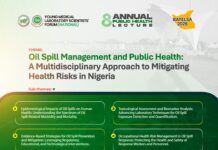The practitioners of Science Laboratory Technology seem to be very determined in their attempt to continue to create confusion in the minds of the unsuspecting public about their true identity.
This is seen in the response by two SLT practitioners, Akpede Akpevwe and Ewhre Oberhiri, to an article that was published to clarify the confusion in identity between the two disciplines.
In the interest of the public and the health of Nigerians, it is important to further clarify the issues that were raised in the response by the SLT practitioners, as follows:
(a) The SLT practitioners stated that “While medical laboratory practice primarily focuses on routine analysis, SLT encompasses a broader scope that involves extensive research and investigation”. This is more like a statement made to comfort themselves. What are the components of the “broader scope” that make up the SLT?
Is there any field that SLT researches into that is unique to it? Not at all. SLT practitioners work in the various fields of science- Geology, Petroleum, Biology, Chemistry, Biochemistry, Physics, Electronics, Physiology/pharmacology- but as Technologists. They obviously cannot replace the degree holders in these fields.
So, what broader scope do the SLT practitioners do in science, how much more in medical laboratory science practice?
(b) They also stated that “There are also SLTs specialising in physiology and pharmacology techniques who are well-trained in these subjects, enabling them to carry out extensive research and contribute to medical breakthroughs in their respective areas of practice”.
It is important to note that it takes more than “physiology and pharmacology techniques” to become a Medical Laboratory Scientist. Specialising in the “techniques” only obvious deficiency in that study area. Medical Laboratory Scientists undergo rigorous training in both theory and practical in the basic medical sciences- physiology, anatomy, biochemistry, pharmacology, microbiology. The clinical years of training for MLS involves the clinical applications of these disciplines, including pathology of diseases.
This is enhanced in the “hospital posting/clinical laboratory posting” that MLS students undergo at year 4 and year 5. On graduation, the MLS must undergo a hospital-based internship training for one year. It will be foolhardy to compare the graduate MLS to an SLT who only “specialized in physiology and pharmacology techniques”.
The BMAS and CCMAS are the documents of the National Universities Commission (NUC) that show the philosophy and course curriculum of each discipline in the university system. They are public documents that the members of the public can read in order to verify the curriculum of SLT as compared to MLS. Firstly, the philosophy of each programme is different, so MLS cannot share same philosophy with SLT.
(c) They further stated that “It is concerning how some government bodies, states, and parastatals, particularly Hospital Management Boards and Primary Health Care Development Agencies (PHCDA), are influenced by the MLSCN’s claims that SLTs are ineligible to handle blood samples. This raises questions about the type of samples biomedical, physiology, and pharmacology professionals, who are part of the SLT profession, are qualified to handle”. Simply put, SLTs are not trained to handle human samples for medical diagnoses. That is why section 2(2)(l) of NISLT Act empowered them to “conducting inspection of science laboratories in schools, post-secondary institutions, industries and research institutes in order to improve the professional standards”. No mandate on medical field stated in their Act.
Similarly, NUC cannot approved for them a curriculum that contains the professional areas that are known globally as medical laboratory diagnosis. When a person, who does not have the training and license to handle human life begins to do so, “quackery” is the appropriate English word to describe such. How can quacks be employed to work in health centres and other health facilities? It does not make sense that SLT practitioners will abandon chemistry, physics and biology labs in secondary schools, and higher institutions, industries and research institutes and rather be focusing on medical laboratory.
Further, it is a fallacy to refer to degree holders in physiology, and pharmacology as members of SLT. No, they are not.
It is important for the public to know that no government in the world has ever given two or more professional bodies the same duty or function to perform. That will amount to anarchy. Therefore, the request of SLT practitioners asking the government to allow them to work as medical laboratorians at the Hospital Management Boards and Primary Health Care Development Agencies (PHCDA) is not sensible.
In order to help these SLT practitioners to educate us more about their chosen profession, it may be necessary for them to provide answers to the following questions:
(a) Why is it that SLT has no international professional equivalent? For example, a Medical Laboratory Scientist in Nigeria is recognized to practice as such in UK, USA, Canada, Australia, Netherlands, New Zealand, and other countries, because it is a globally recognized profession. Is that the same with SLT? Can an SLT be licensed to practice as MLS in foreign countries?
(b) They made references to the BMAS and CCMAS of SLT in NUC. Why did NUC not include SLT under Allied Health Sciences, Basic Medical Sciences or any other health science division in the BMAS or CCMAS? Is this not a testimony that even NUC does not recognize SLT as part of the human resources for health?
(c) The job descriptions of physicians, nurses, optometrists, physiotherapists, radiographers, dentists, Medical Laboratory Scientists, engineers, surveyors, architects, accountants, lawyers, etc, are known and recognized globally as their specific roles. What actually is/are the specific roles/job descriptions of the SLT? What does the world know and recognize SLT for?
Finally, it is important that the SLT practitioners should desist from engaging in quackery and willful destruction of lives of our people. They are advised to maintain their boundaries as explicitly provided in their NISLT Act.
Dr. Kemzi Elechi-Amadi writes from Port Harcourt, Nigeria

















